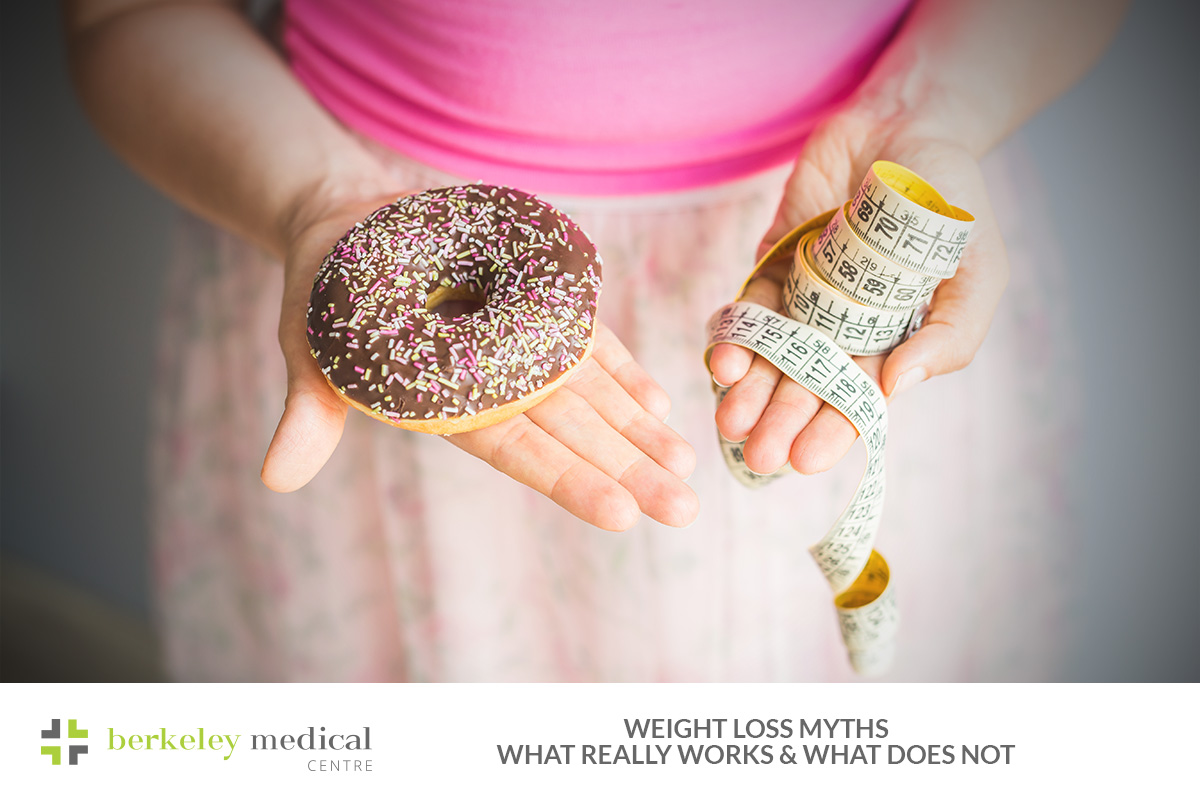In Australia, more people are struggling with their weight than ever before. Around 75% of men and 60% of women are classified as overweight or obese. This rise in body weight has led to an increase in preventable conditions such as heart disease, type 2 diabetes and high blood pressure.
As the demand for weight loss solutions grows, so does the spread of misleading information. Fad diets, celebrity-endorsed programs and “magic” weight loss hacks promise quick results but often fall short. In reality, many of these trends do more harm than good.
In this article, we will debunk common weight loss myths, explain why they are misleading and outline what actually helps people lose weight safely and sustainably.
Myth 1: Carbohydrates Cause Weight Gain
Many people believe that cutting out carbs will help them shed kilos quickly. However, this idea is not backed by science. Carbohydrates are the body’s preferred source of energy, especially for the brain and muscles. When consumed in appropriate portions and from nutritious sources, carbs can support a healthy diet.
Wholegrain, fruits, vegetables and legumes provide essential nutrients and fibre that helps with satiety and digestion. The issue lies not with carbs themselves, but with:
- Large portion sizes
- Highly processed foods
- Excess kilojoule intake
Truth: Carbohydrates alone do not cause weight gain. Eating more kilojoules than your body uses regardless of whether they come from carbs, protein or fat leads to weight gain.
Myth 2: Low-Carb Diets Are the Best Way to Lose Weight
Low-carb diets like Keto, Atkins and Paleo have gained popularity for their rapid initial weight loss. However, that early weight loss is mostly water, not fat. In the long term, studies show that low-carb diets offer no significant advantage over balanced eating plans when it comes to sustainable weight loss.
Moreover, cutting out carbs completely can lead to:
- Fatigue and poor concentration
- Constipation due to lack of fibre
- Micronutrient deficiencies
- Kidney strain in people with existing issues
- High cholesterol if saturated fats are consumed in excess
Truth: Any diet that reduces kilojoules can lead to weight loss. But long-term success comes from balanced, nutrient-rich eating.
Myth 3: Skipping Meals Helps with Weight Loss
Many people think that skipping meals is a simple way to cut kilojoules. However, this can trigger:
- Slowed metabolism
- Low energy levels
- Poor concentration
- Binge eating later in the day
Eating regular meals helps maintain steady blood sugar levels and supports better portion control.
Truth: Regular, balanced meals are more effective than skipping food.
Myth 4: Detox and Single-Food Diets Are Effective
Detox teas, juice cleanses and single-food diets (like grapefruit-only plans) may promise fast results, but they are not based on science. The body already has a built-in detox system your liver and kidneys.
These diets can cause:
- Nutrient deficiencies
- Muscle loss
- Digestive issues
Truth: You do not need to detox or restrict yourself to one food to lose weight.
Myth 5: Superfoods Burn Fat
Super foods such as kale, chia seeds and spirulina are nutrient-dense, but they do not have fat-burning powers. They are valuable in a well-rounded diet but would not lead to weight loss unless you are in a kilojoule deficit.
Truth: No single food causes fat loss. A balanced diet and exercise are still essential.
Myth 6: Gluten-Free and Clean Eating Are Keys to Weight Loss
Going gluten-free may sound healthy, but unless you have coeliac disease or gluten intolerance, it is unnecessary and may even backfire. Many gluten-free packaged foods are low in fibre and high in kilojoules, leading to weight gain.
Similarly, “clean eating” can be helpful when focused on minimally processed whole foods, but it can also create restrictive habits if not done carefully.
Truth: Gluten-free or clean-labelled foods are not inherently better for weight loss.
Myth 7: Intermittent Fasting Works Better Than Other Diets
Intermittent fasting, including methods like 5:2 or 16:8, can help some people eat fewer kilojoules. However, research shows that fasting does not result in significantly more weight loss than traditional calorie restriction.
It works best for those who can stick to the pattern long term. If it feels unsustainable, it is not the right approach for you.
Truth: Fasting is one of many methods to reduce energy intake it is not a one-size-fits-all solution.
Myth 8: Liquid Calories Do not Matter
Many drinks are loaded with empty kilojoules from soft drinks and fruit juices to iced coffees and alcohol. These beverages do not fill you up but add significant energy intake to your day.
For example:
- Cutting down two bottles of soft drink daily = ~17kg of potential weight loss per year
Truth: Liquid calories add up quickly and can sabotage weight loss goals.
What Actually Works for Weight Loss?
Instead of following fad diets or buying into marketing hype, focus on evidence-based strategies that promote lasting change.
Here’s what works:
- Eat a wide variety of whole foods
- Limit processed and high-fat foods
- Control portion sizes
- Drink water instead of sugary drinks
- Be physically active most days
- Cut back on added sugars and alcohol
- Maintain a regular eating schedule
- Seek support from a qualified dietician or GP
Focus on your waist measurement, not just your weight. A healthy waist circumference is:
- Less than 94cm for men
- Less than 80cm for women
Final Thoughts
There’s no magic bullet when it comes to healthy, long-term weight loss. The most effective approach is one that you can maintain based on balanced nutrition, regular movement and habits you can stick with for life.
By cutting through the myths and focusing on science, you will set yourself up for success without extreme restrictions or unrealistic goals. If you are unsure where to begin or struggling with your current plan, speak to a qualified dietician or health professional who can provide tailored advice.
At Berkeley Medical Centre, we understand that losing weight is not just about willpower it is about having the right support, information and personalised care. Our experienced general practitioners provide guidance tailored to your unique health profile, lifestyle and goals.







